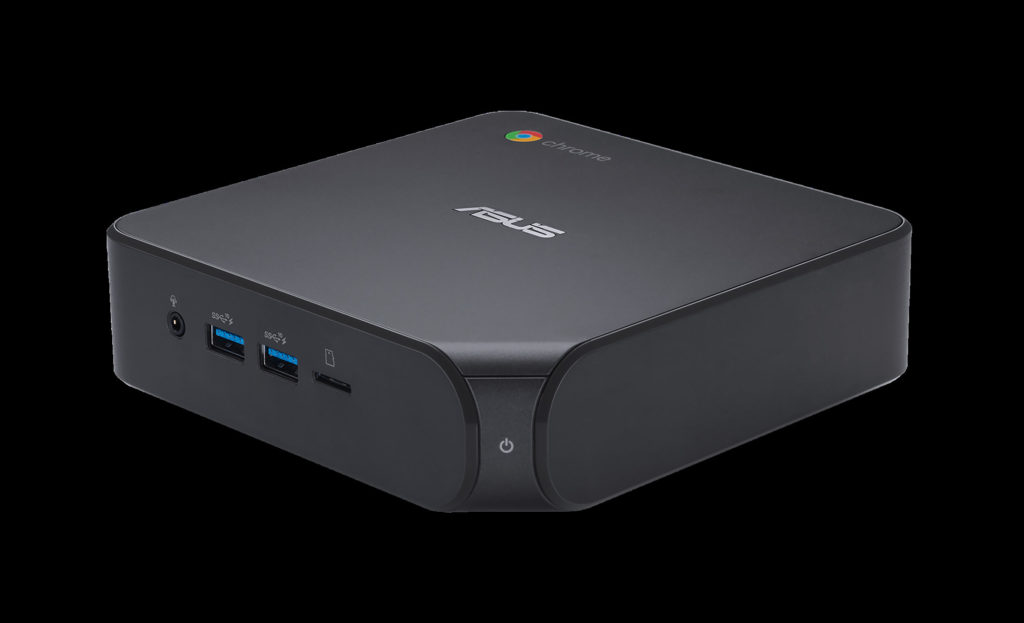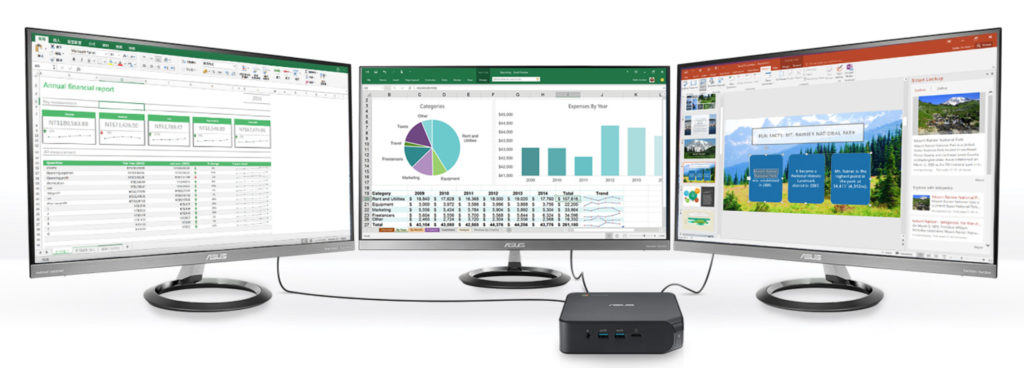It definitely seems to me that Chromeboxes are on a two-year refresh cycle. The last one was in 2018 with 8th-Intel chips and this year, we’re seeing new models with 10th-gen processors. The latest is the Asus Chromebox 4, which follows the HP Chromebox G3 that went on sale last month. And like most Chromeboxes, there are few differences between different branded models.
The predecessor to the Asus Chromebox 4 had a starting price of $239 back in 2018. This refreshed model will set you back $50 more, as the base configuration with Intel Pentium Celeron costs $289. That’s a tad more than HP’s Chromebox G3, which starts at $257.

So what do you get for your extra money?
Obviously, the more capable 10th-generation Intel processors, which are the aforementioned Celeron 5205U, Core i3-10110U, Core i5-10210U, or Core i7-10510U. Wireless connectivity is boosted as well with support for 802.11ax networks, aka: WiFi 6. Bluetooth 5.0 and Gibagit wired ethernet support is also on board. Memory choices are either 4- or 8GB while there are four different storage options:
- 32G eMMC
- 64G eMMC
- 128GB M.2 SATA SSD
- 256GB M.2 SATA SSD
Being a Chromebox, there’s no lack of ports and slots. A pair of USB Type-A3.1 Gen2 and microSD card reader are on the front, while the back adds a trio of USB Type-A 3.1 and one USB 3.2 Type-C jacks, as well as a pair of full-sized HDMI outputs. Asus says you can power three 4K displays with the HDMIs and the Type C output.

Asus will begin selling the new Chromebox 4 next month. There’s no information yet on the different configuration pricing; only the base model. The company will offer a bundle package that includes a Chrome OS wired keyboard and mouse.
Since most Chromeboxes get a refresh around the same time, there isn’t much to differentiate between them, whether you’re considering one from Acer, Asus or HP. I wonder if Asus missed an opportunity to stand out a little, given that its base price point is above the HP Chromebox G3.
The company announced 11th-gen Intel laptops back in September, so maybe Asus should have broken the cycle by using newer chips this time around. That would be a nice differentiation from the other brands and help justify a higher cost.


5 Comments
I am a big fan of chromebooks, but I cannot actually figure why people should buy chromeboxes as they are currently declined.
I mean, the original concept of the first breed of chromebooks was about a kind of devices which were very close to thin clients, since everything was web-based and the raw power of their Cpus was not that important.
Nowasday’s chromebook can run android and Gnu linux via crostini, so they are much more capable, but still they don’t usually sport a very fast Cpu nor a discrete Gpu, since they are more or less deemed to being mobile devices. That’s why even the most powerful Chromebooks are equipped with U series Cpus which are great for power consumption and are ok for brief time intensive tasks, but not for continuos heavy workloads.
In my opinion, with a Celeron N4100 or an i3 and a 4-8 gigs ram, a chromebook delivers a very good experience at a very low price (3-400 Euros). So why should anyone spend the same amount of money to buy a chromebox with a Cpu of the U series which by design should go for mobile devices?
I know that chromeboxes are small, don’t have a fan and require more or less the same hardware as a mobile laptop and that’s why I can’t see the use case they are aiming at.
Why doesn’t any manifacturer sell a chromebox with a real desktop Cpu and a discrete Cpu? With crostini, it could be a real workhorse,
@Luca Bosi
“I cannot actually figure why people should buy chromeboxes”
Because a desktop experience is different to a laptop experience.
At work I’m mobile so I need a laptop. My Asus C434 is plenty capable of doing everything I need.
At home though my workspace is stationary and I want a larger display and a keyboard/mouse/trackpad that are not attached to the display. For that I bought the base model Asus Chromebox 3, bumped the RAM to 8GB and it’s a perfectly good worstation that does everything I need. I normally have 3 accounts open with a number of tabs open in each and I occassionaly use Android apps and Crostini. While it may not be blazing fast it is quick enough for what I do. At an all up price of USD$245 it’s an easy buy.
incidentally I also have a Mac Mini set up in the same workspace and very rarely use it. I prefer using CrOS.
Very nice, something wrong with you if you don’t have a dream about one of these tonight!
Thanks for sharing your points politely instead of saying that there is something wrong in me. Btw, after reading the very kind comment of the other poster, I was already calling the doctor for a check-up:)
That’s why I want share my own points too.
First, I bought 2 chromebooks and I still own 1. I converted 4 laptops/2 in 1 to chrome OS (a couple of them recently broke) with the brunch framework. Before coming to the brunch framework, I had discovered an easy way of adding a Google account to FydeOS and removing the chinese stuff (you can still find an old thread of mine at xda-developers) and I had moved to FydeOS a couple of desktop. In the past, I had also intensively tested cloudready on a bunch of devices.
I have a beefier Thinkpad i5 which still runs windows which is mandatory for a couple of softwares I have got to use for work purposes (in dual boot with linux debian and sometimes I use it with chrome OS off an usb key).
Before converting to chrome OS, my family and office devices used to be linux machines only.
This premise is here to say that I actually love ChromeOS and linux in general and that I am that kind of guy that loves tinkering with devices and getting his hands dirty with code (though coding is not my job). Chrome OS is now a very capable OS and chromeboxes are good as well, generally speaking.
So, let’s come to your point and I get that “a desktop experience is different to a laptop experience” and I agree to it. A full-size keyboard, a bigger screen, more ports, attaching peripherals and so on: that’s good and that’s a different way of working, browsing, gaming etc..
But with the money that you ought spend to buy a chromebox and another chromebook for your mobile needs, you could buy a premium chromebook and, when at home, you might attach a screen, a keyboard and so on. Unless your laptop isn’t a chromebook and is a Mac or a Windows device, you just have to attach those peripherals, maybe buy a 10 Euros usb hub to extend the avalaible ports and you’ll get the same desktop experience at a very likely lower price.
If your office device is not a chromebook and you don’t want to fiddle with its partitions, still you might run chrome OS with the brunch framework when at home, maybe on a spare usb key, it is very easy. There are 40 Euros usb keys that grant the performance of a good ssd.
The only big difference is that you can double the ram of a chromebox, while you cannot do it on a chromebook. But if your chromebook or your office device has already such ram, you obviously don’t need such upgrade. The other difference is that someone else could use your chromebox while you’re at work and it could be a plus if you want to share it with your family: that’s a thing I hadn’t thought of. My wife and my daughter already have got their own chromebooks, but that’s not the rule.
So, I understand that in the US chromeboxes are dirt cheap (while in Italy they sadly are totally missing) and that thing might make them a steal, but I’m still not convinced that buying any chromebox is a good choice, if you already have a laptop (chromebook or not) unless there is any significant hardware advantage in such chromebox.
But I must admit that there are use cases when one more device at home could be very useful.
Have a good day.
@Luca Bosi
“with the money that you ought spend to buy a chromebox and another chromebook for your mobile needs, you could buy a premium chromebook and, when at home, you might attach a screen, a keyboard and so on”
That’s true but I also like to tinker and one of the reasons I bought the Chromebox was to see if it would be appropriate for my customers. I work in IT Support.
Yes, other people might like to have the one Chromebook but I also like the convenience of having my desktop workstation always setup and ready to go. Sometimes I’ll leave it running processes too. And I can remote in if need be.
“in the US chromeboxes are dirt cheap (while in Italy they sadly are totally missing)”
My Chromebox was USD$245 including shipping to Australia where I live. I almost never buy computer equipment here. Most of the time I buy from Amazon USA. This onehttps://amzn.to/2JQ8Sc8
is USD$199 + $88 shipping to Italy. Great for timkering and there are plenty of others there as well.